The Light from the TV Shows: A Chat with Michael Dorn (‘Star Trek: The Next Generation’)
Michael Dorn may have come to be known best for his work as Worf, the most famous Klingon in the ‘Star Trek’ universe, but his acting career was already off and running well before he found his way onto the bridge of the U.S.S. Enterprise. Bullz-Eye had a chance to chat with Dorn in connection with the Blu-ray release of ‘Star trek: The Next Generation – The Complete Fourth Season,’ and he discussed some of his pre-‘Trek’ roles, including working with Bruce Jenner and Sylvester Stallone, in addition to revisiting his work as Worf and commenting on how things are going with the ‘Captain Worf’ series he’s been hoping to make
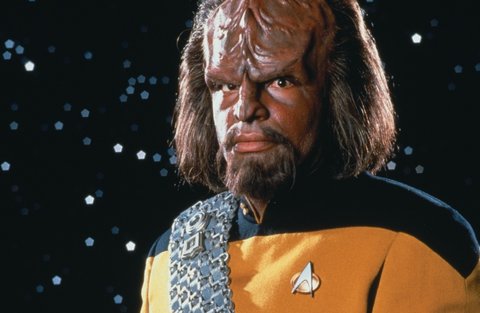
Bullz-Eye: So how have you been enjoying seeing the ‘Next Generation’ episodes on Blu-ray?
Michael Dorn: Well, I haven’t seen this season’s yet, but the other ones have looked great. Just beautiful.
BE: When they first started rolling them out, I was really rather startled by the difference. I knew it’d look better, but it never occurred to me that it’d be quite that substantial.
MD: Yeah, exactly. I mean, it’s one of those things that makes you realize just how much technology and other things have changed. When we were doing our show in the late ‘80s and early ‘90s, we looked at the original series and we were, like, “Ah, we’re so far ahead of that!” And now we look at our show side by side, and it’s, like, “Oh, my God…” [Laughs.] Technology has just grown by leaps and bounds. But it looks spectacular.
BE: As far as getting the part of Worf, I’ve read that you feel like you got it because you walked into the audition with kind of a Klingon mindset.
MD: Yeah, I think that…well, y’know, from what the producers say, there were two of us that were really kind of vying for the part – the other was James Avery, who’s a fabulous actor – and the producers said, “Well, we had to go with a young one, so we went with you.” [Laughs.] It had nothing to do with the performance. They said, “Yeah, the readings were great, but James’s reading was better than yours. But you were younger.” Which is horrible to say to an actor, but… I like to think that I came in and I was Worf, basically. Because I knew that Klingons are very no-nonsense and get-to-the-point. They say what they’re going to say and they leave, yknow? So that’s what I took into the audition.
BE: When you approached the idea of doing ‘Star Trek: The Next Generation,’ were you considering that, although it was clearly a possibility of a long-term gig, it also had the potential for a long time in makeup?
MD: Not at all. None of that came into it. Interestingly enough, at that point in my career I was doing a lot of difference stuff. I mean, I was really happy because I was doing drama, I was doing comedy…I was working like crazy, which was great. And this was just another audition, although when I heard that they were doing one, I called my agents and managers immediately and said, “Oh, you’ve gotta get me in! I want to do this!” But they called and they said, “Okay, we’re sorry, but it’s already been cast. It’s done.” And I kind of went on with the rest of my life. I went, “Okay, well, that’s life,” and I kind of went back to what I was doing. But then I got a call two weeks later saying that they’d come up with this part and they wanted to see me for it. But you don’t know what’s going to happen with these things. Even at that point, I’d been in the business long enough to know that you just never know. It’s better not to think about those things, because most of the time it doesn’t work out like you think it’s going to work out.
BE: How did you feel about the evolution of Worf as a character over the course of the run of the series? Were there any missteps from your perspective, or did you think things went pretty swimmingly?
MD: I think it went really well. Exceptionally well. I never had to storm up to the office and yell at them about where my character should be. I was always excited about getting a script and going, “Oh, my God!” And that was for a couple of reasons. There were other characters, you could only write so many episodes about each character, but they put a lot of effort into that, because when you’re talking about Klingons…I mean, you’re not generally talking about Starfleet, you’re not talking about a love story, or any of the regular things. They had to come up with really interesting and different ideas for the Klingons, So whenever they came up with something, it was very special, and I was always blown away and really happy about what they wrote. There was one episode where a Romulan needed my blood, and I didn’t give it to him, and he died. And I was concerned about that. That was one of the few times, maybe the only time, that I went to Rick Berman’s office and said, “What do you think? Do you really want to do this?” And he said, “Absolutely!” And I think it turned out really well.
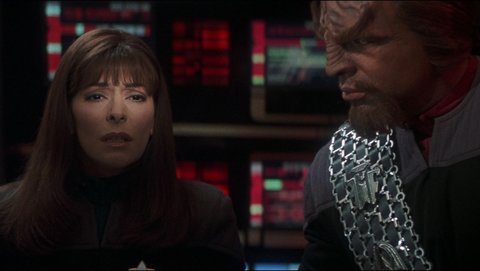
BE: What were your thoughts on the whole Worf/Troi storyline?
MD: I liked it! I thought it was Beauty and the Beast all over again. I mean, she’s this copacetic, sweet, smart, understanding, kind, warmhearted person…and Worf is not. [Laughs.] I thought it was good, because he really is just a big, dumb, stupid kid. He was, like, “Well, what do I do now?” But I do think they wimped out on one thing, which was the Klingon courtship…or, y’know, the Klingon foreplay. Which is very violent. They kind of softened him up for that, which I think was a mistake. But I actually liked it as a whole, and I think that, had they given it more time, it certainly would have developed into something spectacular. But that’s the way it goes. But to their credit, I was extremely happy when Terry Farrell and I got together on ‘Deep Space (Nine).’ They really dealt with their relationship in a Klingon way, the way it should be.
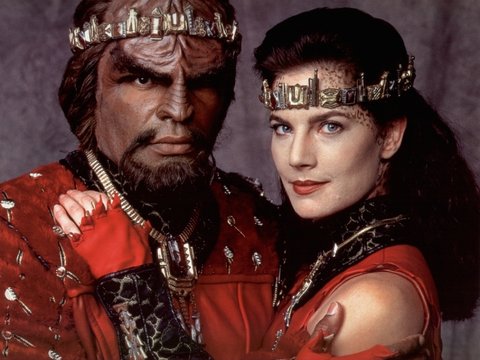
BE: Which provides a perfect opportunity to ask you about Worf’s transition onto that series. Were you always intended to be a regular, or was it a case where a guest spot ended up being expanded into more?
MD: No, no, I got a call out of the blue…and I mean seriously out of the blue. I think I was in Baltimore doing a video game, actually! But I got a call from the producers saying, “Hey, Michael, what would you think about coming back (as Worf) on ‘Deep Space’?” And to my shock, I was, like, “Sounds like fun!” And I knew at that point that they wanted to boost the ratings, so the character was not going to be, y’know, just a guy who’s kind of in there and standing around. And I didn’t want it to be that way. I said, “If that’s what you want, then I’m not interested, so please don’t do that. I love the character, I love you guys, and I love the show, but I just don’t want to do that.”
And they said, “No, no, no,” and they named a bunch of episodes I was going to have and said, “It’s going to be this and this. It’s not going to be ‘The Worf Show,’ but you’re definitely going to be prominent.” So I said, “Okay.” There were two things about it for me. I just felt it was a great challenge, because you’re coming on a new show where you’re around new characters and new people – although I’d met them before – and you’re also starting in the middle rather than at the beginning, which is never easy. But I took it as a challenge, and I loved it. The people were great, and they’re still great friends of mine now, so it worked out really well.
BE: Speaking of ‘The Worf Show,’ you’ve mentioned it before and expressed considerable interest in it, but where do things stand with the prospect of a ‘Captain Worf’ series? Has there been any headway made with it?
MD: Well, no. Not in the business world, anyway. But in my world, yes. [Laughs.] I’ve finished the script, and I’m just in the process of kind of finalizing the look of it, in terms of how I’m going to send it out. I’m just thinking about inundating people in the business with the script and seeing if they like it, maybe generating some more interest in the process.
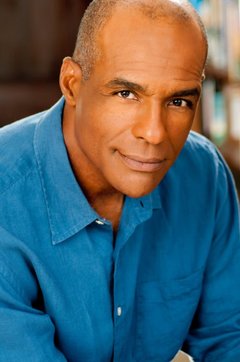
BE: I wanted to ask you about a few other things from your back catalog. First of all, I’ve read how, before you began pursuing acting full-time, you’d actually been working in music. What was your career highlight as a musician?
MD: Oh, boy. I think I was when I’d just started doing session work, probably somewhere around when I’d just finished my second or third session, which was great. Doing session work was a highlight. But the music business was rough, and there was a point where I… I didn’t flip a coin, but I really had to decide to pursue one or the other, because they were both going in the same direction. With both of them, you could see, “Well, this is going to be great,” and I loved acting and music, but I had to make a decision. And then I had a bad experience right around that time with music… [Starts to laugh.] Anyway, that kind of really showed me that acting was the way to go.
I remember it so clearly. It happened when we went down to San Diego. We all drove down there, and it was this big band, something like 10 pieces, kind of like a Earth Wind & Fire thing, and we were backing up this other group. At the end of it… We’d done four or five sets, and at the end of it, they said, “We want one more set!” We said, “Okay, great, but we’re only contracted for five, so you’ve got to pay us for six.” And they said, “No! We’re not going to pay you, and if you don’t play six sets, you’re not even going to get what we owe you!” And I went, “Okay, that’s enough.” [Laughs.] “I think I’m gonna try acting.” That was the impetus, because that happens in music a lot, but it doesn’t happen in acting. Especially not in those days. Also, I’d been in three or four bands, and, y’know, one band member would decide to leave, or one guy couldn’t find his drums, or something, and it would always set you back three or four steps. So you were depending on four or five or ten other people to have the mindset as you do, and that didn’t sit well with me.
BE: You mentioned that you were doing session work. Who were you working with?
MD: Oh, it was this lady that was a big singer in London…but I’ve totally forgotten her name now! [Laughs.] It wasn’t like it was anyone that you’d really know, or that even I knew. It was just a case where, like, a guy would call and say, “Michael, we need a bass player for this session. Can you come in?” And I’d say, “Great!” But that was a big deal, just to get those calls. You could see that it could’ve been the start of something.
BE: Not that it was a big part, but what do you recall about the experience of playing Apollo Creed’s bodyguard in ‘Rocky’?
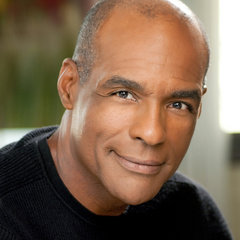
MD: It was really, really, really interesting. [Laughs.] Just because it was my first gig. It was only supposed to be a day, and it turned into two weeks. I remember that Sylvester Stallone, between the fight scenes, during the set-ups, he’d be laying on a massage table, writing the next scene. I mean, writing writing writing writing. I was just, like, blown away by that. Actually, I worked with him on a movie called ‘Shade.’ He’s a very nice guy. I was sitting next to him, and I said, “Hi, Mr. Stallone, I’m Michael Dorn, and you and I have a history.” He said, “Really?” And I told him about it.
I also told him about how I was hearing at the time that nobody wanted the movie. I was, like, “They didn’t like you, they didn’t like the movie…they just didn’t want to do it!” And he said, “Lemme tell ya a funny story: they actually literally were gonna pull the plug on the movie.” I said, “What do you mean?” He said that he wanted to do a scene where he was drunk, and they kept saying, “No, no, no.” And he said, “I’ve got to do this scene! The movie doesn’t make any sense without it!” And they said, “No, no, no.” He said, “Give me one take!” They said, “Okay, you’ve got one take.” And they had a guy out at the generator, ready to pull the plug out of the generator if he tried to do two takes. [Laughs.] And then he goes on to make billions of dollars for these people!
BE: Have you got any recollections about working with Bruce Jenner on ‘CHiPs’?
MD: Oh, yeah. You know, that was just an odd time. I really saw the business from a different angle after that. Bruce comes in, and Bruce is a great guy. I mean, he got in there, he played the part, and people liked him…and then when Erik (Estrada) came back, he left. And that was kind of it. But I saw the business side of the business during that. It can get a little, uh, interesting at times. But Bruce was great.
BE: Do you have a favorite bit of voice acting that you’ve done over the years? You’ve certainly worked on enough animated series.
MD: You know, I like ‘I.M. Weasel.’ I really liked it. It was an odd, edgy cartoon, and I liked that. I’m a big ‘South Park’ fan, so I liked edginess. I like it when they kind of push the envelope…and they would push the envelope on that show. [Laughs.] I’d be reading the script, and I’d say, “Are you guys sure we can say this on a cartoon?” They’d say, “Yeah, we ran it by Standards & Practices, and they said, ‘No problem.’” So I said, “Ooooooookay…”
There was one episode where they were talking about a Tesla coil, and, y’know, Baboon would always mangle words, so he came up with, “Oh, Weasel, you’re messing up my Testicle!” And they let it go by! Even then, I was, like, “Are you sure? Because…” “Yes! Just don’t say anything!” [Laughs.] But it was fun. The group was great, and I still see some of them when I do other stuff. But, anyway, that was my favorite.
BE: You turned up on ‘Adventure Time’ not too long ago.
MD: Yeah! And I did another one last week.
BE: I just talked to Jonathan Frakes the other day about him having done the show as well.
MD: Yeah, several of us have done it now, I think.
BE: Just in closing, in a weird bit of coincidence, you’re actually the second cast member from ‘Star Trek VI: The Undiscovered Country’ that I’ve talked to today: I interviewed Christopher Plummer a few hours ago.
MD: Oh, wow! Man, that was exceptional. You know, you work with these people that you’ve seen all your life, and it was just…I mean, it was one of those moments that you just cherish. Another case of that was when I worked with John Colicos, who played Kor. I had two episodes with him on ‘Deep Space,’ and he was just a brilliant, brilliant actor. He’s gone now – that was the last work that he did before he did – but, man, he was just outstanding. Just exceptional. You look at guys like that, and you see why they keep working. It’s truly inspiring.
Related Posts
You can follow us on Twitter and Facebook for content updates. Also, sign up for our email list for weekly updates and check us out on Google+ as well.
Posted in: Entertainment, Interviews, News, Television
Tags: Adventure Time, Apollo Creed, Bruce Jenner, Captain Worf, CHiPs, Christopher Plummer, Erik Estrada, I.M. Weasel, James Avery, John Colicos, Klingons, Kor, Michael Dorn, Rick Berman, Rocky, Shade, Star Trek, Star Trek VI: The Undiscovered Country, Star Trek: Deep Space Nine, Star Trek: The Next Generation, Sylvester Stallone, Terry Farrell, The Light from the TV Shows, Troi, Will Harris, Worf










